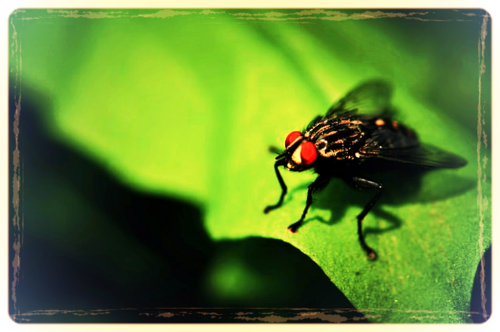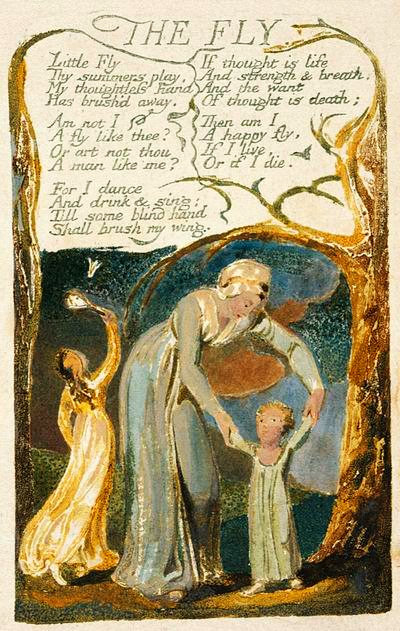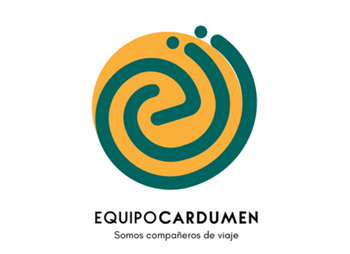
CC0 Creative Commons Image
At this point, the very beginning of my attempt to offer a fair reading of one of my favorite poems on this world of fancy, you already know this will not be about the biopunk film from the 50s.
This is about human insignificance.
British author William Blake (1757-1827) composed this poem and engraved it at the end of the XVIII century as part of his Songs of Experience (1794). The image of the original work is in the public domain, so you can read the original verses here:

The Fly - Engraving by William Blake (1794) - Public Domain Image
I studied Blake in college as one of the most relevant poets in the history of British literature, but I was not really impressed until a couple of years later when I got to read more of his work and less of his biography. If you have read his poetry, you should have learned by yourselves his work is extremely difficult to classify—which I consider a good thing, actually. Blake’s work is pretty much out of time and his genius, beyond the reach of tendencies. I understood that after I had read “The Fly,” along with all of his poems, some of them several times.
Stanza 1
The speaker addresses his interlocutor from the very beginning, using a straightforward tone. He—let us call the speaker he—talks to the fly and makes an initial observation:
Little fly,
Thy summer’s play
My thoughtless hand
Has brushed away.
The epithet little enhances the insignificance of the insect. The humanization of the hand speaks of the unconsciousness of the speaker, obviously by metonymy.
Stanzas 2 and 3
Then he compares himself to the insect.
Am not I
A fly like thee?
Or art not thou
A man like me?
For I dance
And drink and sing,
Till some blind hand
Shall brush my wing.
At first, it seems both an innocent questioning and comparison. However, we suddenly wonder whose blind hand that is.
Stanzas 4 and 5
When we think we are about to figure out the meaning of the poem, which looks easy at first, for it is short and written in unadorned English, these two stanzas appear:
If thought is life
And strength and breath,
And the want
Of thought is death,
Then we learn we have just started to understand. Life, along with all physical faculties implied, is nothing beyond human imagination, a call for Berkeley’s Subjective Idealism perhaps; in the absence of a sapient individual reality is zero,
Then am I
A happy fly,
If I live,
Or if I die.
For all the world we perceive through our senses is but a machination of the human brain.
“The Fly” speaks of God as a blind hand because He is not actually seeing what we are seeing. What is real for us means something for the Creator which is far beyond our understanding.
We must understand blind as a projection of our own impossibility to watch through the eyes of Divinity.
Our summer’s play, just a season of childish games of life is insignificant, a puerile fabrication.

Thanks for reading Part 1/3
Posted from my blog with SteemPress : https://marlyncabrera.timeets.com/2018/09/08/on-blakes-poem-the-fly-part-1-3/
CC0 Creative Commons Image
The Fly by William Blake (1794) – Public Domain Image

Here, my invitation to join @EquipoCardumen on Discord (Spanish only).
Here, the link to #SteemitSchool on Discord (English + all languages)

Logo designed by @octocel
Image designed by @wilins ♥

Logo designed by @octocel

Great reading of Blake's poem, @marlyncabrera. Students of literature and readers in general (especially those who find reading and understanding poetry an alien thing) should benefit from your step-by-step approach. Very insightful.
We should inscribe these words in our campus:
Downvoting a post can decrease pending rewards and make it less visible. Common reasons:
Submit
Some people shun poetry because they think it is cryptic or is just about whimsical phrasing. Blake's work should prove them wrong.
Thanks for reading, dear @hlezama :D
Downvoting a post can decrease pending rewards and make it less visible. Common reasons:
Submit
This post was shared in the Curation Collective Discord community for curators, and upvoted and resteemed by the @c-squared community account after manual review.
Downvoting a post can decrease pending rewards and make it less visible. Common reasons:
Submit
Thank you, @c-squared, for promoting the creation of original content on Steemit. Much appreciated! :D
Downvoting a post can decrease pending rewards and make it less visible. Common reasons:
Submit